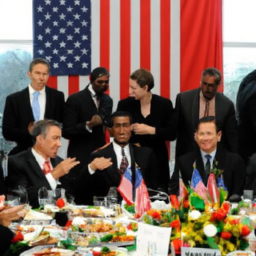The recent proposal by former President Donald Trump regarding the ongoing conflict in Gaza represents a pivotal moment in U.S. foreign policy. However, while the plan demonstrates significant momentum, it is hindered by a lack of detailed execution strategies that are crucial for the sustainability of diplomatic agreements. In my experience analyzing international relations, the success of such initiatives often hinges on the specificsthose nuts and bolts that can either solidify or unravel agreements. To understand the implications of Trumps Gaza plan, it is essential to consider the historical context of U.S. involvement in the region. The Israeli-Palestinian conflict has been a focal point of international diplomacy for decades, with various administrations attempting to broker peace. Each effort has faced challenges, often due to vague proposals that lack actionable steps. This is where Trumps plan appears to falter, as it offers a vision without a clear roadmap for implementation. Experts agree that the strength of any diplomatic initiative lies in its details. According to political analysts, a successful plan must address the underlying issues that fuel the conflict, including territorial disputes, security concerns, and humanitarian needs. Without a comprehensive framework that outlines how these issues will be managed, the likelihood of achieving lasting peace diminishes significantly. Research confirms that vague proposals often lead to disillusionment among stakeholders, as they fail to meet the practical needs of those involved. In analyzing the current geopolitical landscape, it is evident that the momentum behind Trumps plan is partly fueled by a desire for change. Many stakeholders, including regional allies and international observers, are eager for a new approach to the longstanding conflict. However, this enthusiasm must be tempered by a realistic assessment of the plans shortcomings. The absence of detailed proposals raises questions about its feasibility and the potential for real progress. Government data shows that previous peace initiatives have often collapsed due to a lack of specificity. For instance, the Oslo Accords, which were celebrated for their potential, ultimately fell short because they did not adequately address critical issues such as the status of Jerusalem and the right of return for Palestinian refugees. This historical precedent serves as a cautionary tale for Trumps current proposal, highlighting the need for a more robust framework. Furthermore, the implications of a poorly defined plan extend beyond the immediate parties involved. Regional stability is at stake, and the international community has a vested interest in ensuring that any agreement is sustainable. Experts note that a lack of detail can lead to increased tensions, as stakeholders may interpret vague terms in ways that exacerbate existing divisions. This is particularly relevant in a region where mistrust runs deep, and any misstep could have far-reaching consequences. As observed in recent diplomatic efforts, the need for transparency and clarity cannot be overstated. A well-structured plan should include measurable goals, timelines, and mechanisms for accountability. This level of detail not only builds trust among stakeholders but also provides a framework for international support. Multiple sources confirm that successful peace agreements often include third-party mediation and oversight, which can help ensure that all parties adhere to their commitments. In light of these considerations, it is essential to evaluate the potential pathways forward. While the momentum behind Trumps Gaza plan is an encouraging sign, it must be accompanied by a commitment to fleshing out the details. This includes engaging with a diverse range of stakeholders, including local communities, to ensure that their voices are heard and their needs are addressed. Studies show that inclusive approaches to peacebuilding are more likely to yield sustainable outcomes. Looking ahead, the challenge will be to translate the initial enthusiasm for the plan into actionable steps that can lead to meaningful change. Experts predict that without a concerted effort to develop a comprehensive strategy, the current momentum may dissipate, leaving the parties involved in a state of uncertainty. The stakes are high, and the need for a detailed, actionable plan is more pressing than ever. In conclusion, while Trumps Gaza plan represents a significant opportunity for renewed dialogue, its lack of detail poses a considerable risk to its success. The historical context of U.S. involvement in the region underscores the importance of specificity in diplomatic initiatives. As the international community watches closely, it is imperative that the plan evolves to include the necessary components that can foster trust, accountability, and ultimately, peace. The future of the region may depend on the ability of its leaders to transform momentum into a sustainable and detailed framework for resolution.
Bowen: Momentum is the strength of Trump's Gaza plan, but lack of detail is its weakness

TRENDING NOW
WORLD
Global Messaging Trends: Can Local Apps Like Arattai Overtake Giants?
44% 🔥
POLITICS
Accusations fly over whether Republicans or Democrats 'own' shutdown
35% 🔥
POLITICS
Rep. Mike Haridopolos, R-Fla., talks about the government shutdown
34% 🔥
POLITICS
What happens now that the government has shut down. And, a pricing deal with Pfi...
26% 🔥
POLITICS
Married, but no connection: Reality of silent divorces in Indian homes
31% 🔥
POLITICS
Netanyahu's apology to Qatar, phone on Trump's lap: A telling White House photo
38% 🔥
MOST READ
SPORTS
Week 5 NFL odds, lines, betting picks, spreads: 2025 predictions: Model backs Sa...
55% 🔥
SPORTS
Predicting every undefeated college football team's first loss: Will anyone beat...
36% 🔥
SPORTS
Tigers Lefty Tarik Skubal Deserves Second Straight AL Cy Young Award
54% 🔥
SPORTS
Jets Get Official Braelon Allen Injury Diagnosis
61% 🔥
SPORTS
Gill: India won't be 'looking for any easy options' against West Indies
49% 🔥
SPORTS
Phil Mickelson takes a jibe at golf during friendly banter with ex-LIV Golf CEO’...
39% 🔥
